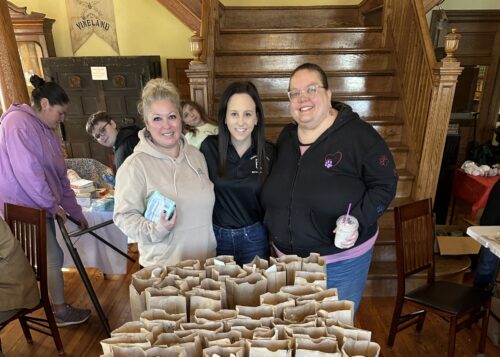Isolating Factors
Health issues of millennials in South Jersey linked to social isolation, with numbers highest in Cumberland County.
Loneliness is the one of the greatest challenges to public health in South Jersey.
According to new research produced by the Senator Walter Rand Institute for Public Affairs at Rutgers University–Camden, millennials and younger residents in southern New Jersey suffer from surprisingly higher rates of social isolation than citizens aged 65 or older which, in turn, can lead to such chronic health conditions as obesity, heart disease, and asthma.
Overall, the report—titled “South Jersey Health Needs: Connections, Community, and Care”—finds that 75 percent of respondents to a survey implemented by the Rutgers–Camden research institute suggest that they rarely or never feel socially isolated, while nine percent report often having such feelings.
According to the report, social isolation can predict a higher number of chronic health conditions. In the Rutgers–Camden research report, those who are often isolated report living with 59 percent more chronic health conditions than the average survey respondent. Across South Jersey, millennials and younger-aged residents (38 or younger) are 50 percent more likely to feel isolated than babyboomers or those who are 55 or older. The Rutgers–Camden study finds that those who report social isolation have 25 percent worse physical health than those who rarely feel socially isolated. Findings about mental health show similar patterns, with those who often feel socially isolated reporting 32 percent worse mental health than those who are rarely socially isolated.
“The findings within this report suggest that younger adults in South Jersey are more socially isolated than older adults,” says Sarah Allred, an associate professor of psychology and faculty director of the Rand Institute, both at Rutgers–Camden. “Our research further suggests that younger adults in our region are more than twice as likely to report fair or poor mental health as older adults.”
According to Allred, who authored the study, younger adults (age 40 and younger) in South Jersey have more mental health concerns than South Jerseyans aged 65 and older. One-quarter of younger residents report “poor” or “fair” mental health, compared to 10 percent of those in the older category, while 22 percent of younger citizens feel “socially isolated” compared to 16 percent of older residents.
College students who participated in the Rutgers–Camden study state that social media impacts their mental health, suggesting that social media increases the pressure to “look perfect” and to acquire more things, which leads to wasteful spending of time and money.
Those who often feel socially isolated are four times as likely to report misusing drugs; three times as likely to report a mental health issue; 2.5 times as likely to report misusing alcohol; about twice as likely to report having heart disease; and roughly 50 percent more likely to be overweight or obese, have diabetes, and/or suffer from asthma.
The Rutgers–Camden report finds that approximately 60 percent of South Jerseyans believe that their neighborhoods are excellent or very good places to live, to buy fruits and vegetables, and to walk and exercise. Fewer South Jerseyans feel that their neighborhoods have good social connections, with only 42 percent reporting that their neighborhoods are excellent or very good places to connect with others.
South Jerseyans who think their neighborhood is a poor or fair place to connect with others are 3.5 times as likely to have poor or fair overall health, 2.7 times as likely to have poor or fair mental health, and 50 percent more likely to be overweight as those who think their neighborhood is a very good or excellent place to connect with others. The patterns are similar for the same responses about a neighborhood as a place to live, as a place to walk and exercise, and as a place to buy fruits and vegetables.
The Rand Institute study also suggests that Cumberland County residents are the least satisfied with their health, with 21 percent of respondents suggesting they are in fair or poor health; Gloucester County has the lowest rate of negative perception, at 13 percent.
Transportation presents significant barriers to health and access to care. Focus-group participants explain that limited transportation options prevent South Jersey residents from receiving important health care, getting healthy food, and connecting with others. Importantly, the same populations who suffer most from loneliness are also least likely to have reliable transportation.
Everyday health, including the battle against obesity, suffers from poor access to transportation. Many South Jersey residents do not drive themselves to do their food shopping. One-third of Camden County residents report difficulty in accessing food stores, compared to one-fourth of Gloucester County residents and one in eight Burlington County residents. Overall, 40 percent of study respondents say that lack of transportation is a barrier to health care in their communities, and 29 percent say that public transportation is a health-related resource missing from their communities.
“South Jersey has poor transportation infrastructure, and that infrastructure falls off dramatically outside of Camden County,” says Allred, who notes that previous Rand Institute research has reported that South Jersey counties have less than half the number of bus stops as North Jersey counties.
“If we confirm the apparent increasing social isolation of younger people, what are the health implications and what steps, if any, might we take to reverse this trend?,” Allred asks. “How might improvements to the transportation infrastructure in target communities impact health and wellbeing? And are there efficient efforts that might increase social connection in communities across the region, improving health in South Jersey and beyond?” n
Walter Rand Institute for Public Affairs at Rutgers University–Camden addresses public policy issues impacting southern New Jersey through applied research, community engagement, and organizational development.











